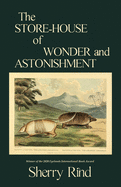
In her learned and mischievous fourth collection, The Store-House of Wonder and Astonishment, Seattle poet Sherry Rind (Between States of Matter) ponders classical and medieval attitudes toward animals.
Rind quotes frequently from Ovid and Pliny in poem epigraphs as she records ancient natural history theories that have since been debunked. For example, Aristotle, unaware of birds' continent-crossing migrations, assumed they hibernate underwater: "Although fishermen may dredge hibernating swallows/ from the depths, the birds soon die/ if awakened before their time," from "Aristotle on the Disappearance of Birds."
"Paradise" describes the island wildlife discovered by Spanish and Portuguese explorers. Other topics include the lack of reptiles in Ireland, a first-century plague of rabbits, and legends of the phoenix. "Elephants, Their Capacity" is one of two poems that imagine what elephants would say to people: "Because you fear our size/ you diminish us." Indeed, a recurring theme is how humans have exploited other species--everything from beavers to toads--for food or medicine over the centuries.
Moving between chastening and celebratory modes, the verse tells stories of connection. One standout, "The Kinde of Hyaena Called Papio," mimics a 16th-century letter recounting a moment of kinship with a monkey in a German park: "You know I keep many animals, but never have I felt I was looking into their faces as one equal to another, on the very edge of words."
Countering the archaic or biblical view of nature "as a store-house of resources provided by a creator for the benefit of human beings," Rind appreciates the creatures in Earth's treasure trove for their own sake. --Rebecca Foster, freelance reviewer, proofreader and blogger at Bookish Beck

